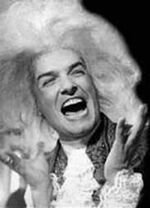Amadeus (film)
Amadeus (Carry On Mozart) was the first so-called "buddy movie" of the 1980's, a comic juggernaut which was a seminal influence on later cinematic works such as Bill and Ludwig's Excellent Nap and Harold and Kafka Go To White Plains, NY. Derided by film critics and the public at the time of its release, the stature of Amadeus improved with age, and is now considered an important touchstone that was ahead of its time by about twenty minutes as the crow flies.
Plot[edit]
- Spoiler Warning: Plot Details and Conspiracy Theories Ahead
Amadeus was originally serialized on the backs of matchbooks in the late 70's, the insides of which advertised the services of certified bail bondsman Hiram McAllister. The rights to the story were picked up by esteemed motion picture director Miles Davis, and production began in 1981, even as an outbreak of syphilis had affected the entire camera crew.
The story of Amadeus concerns Wolfblitzer Amadeus Mozart and Tony "The Fish" Salieri, rivals in the post-modern setting of 18th century Salzburg, Austria. Mozart and Salieri produce live infomercials for the townspeople at large. Salieri's presentations, while informative, are hindered by his strict grammar and somewhat mundane stage presence. Mozart, a much more gregarious sort, impresses audiences with his zeal, product familiarity and colorful language, as this now-famous sequence illustrates:
- Mozart: Folks, I gotta tell ya, this new gadget is about to take France by storm -- but you could be the first on your block to own it now. We have just three minutes left! The single-action blade on this machine cuts right through bread loaves, Cotto salami, and the necks of embittered peasants!
- Prince of Austria: It looks good -- but does it really work?
- Mozart: I knew you'd ask that. Let me demonstrate. I have a volunteer here to help me out. What's your name, sir?
- Johann: Johann Demetrius Von Bauer, sir.
- Mozart: Tell me, Johann, are you disenfranchised from Austria's current ruling class?
- Johann: Yes -- they were real slow on TB aid, and I'm out of cigarettes.
- Mozart: Sounds like an infidel to me! How 'bout you, audience? (Applause. Mozart Throws Johann's neck on chopping block.) You stand with us, or you perish, sir! Have a nice afterlife! (Blade descends and chops off Johann's head.)
- Johann: Ow.
- Prince of Austria: Impressive -- but what about maintenance?
- Mozart: Cleanup's a breeze, sir! Where's that girl with the bucket?
Amadeus then becomes a psychological tete-a-tete between Salieri and Mozart. A secondary character is Mozart's father, an office supply manager who lives vicariously through his son's sales. Mozart is torn between satisfying his father's exacting sense of order and the desires of his wife, Kathie Lee.
Salieri spends most of the movie in stewing resentment of the prodigy, and tricks Mozart into a fake friendship. When Mozart produces an infomercial on food processors, Salieri uses a rarely enforced court ban on grating wheels in an attempt to derail Mozart's career. Fortunately, the Prince of Austria makes an unexpected appearance at a Mozart show, demanding to put the blade back in the food processor ("Is this modern?" the monarch asks).
The film's final third finds Mozart in failing health. Salieri makes shepherd's pie using Mozart's directions, with the hope that the boy genius's death will give him authorship credit:
- Mozart: Okay -- now, add the onions and a cup of diced carrots into the broth, and stir vigorously...
- Salieri: Yes, yes...
- Mozart: And don't forget to check on the potatoes.
- Salieri: Okay...
- Mozart: Do you have it?
- Salieri: I...
- Mozart: Do you have it?
- Salieri: I'm getting there...
- Mozart: Do you have it?
- Mozart: All right, all right -- I'll go check on the potatoes.
At the film's conclusion, Mozart dies, which is an Austrian euphemism for being booted upstairs to a desk job. Salieri spends the rest of his life in a Pizza and Pipes, asking Mozart for forgiveness and tending to the salad bar.
Awards and Nominations[edit]
Amadeus won the Southern Europe Spätzle Cook-Off in 1982, and both F. Scott Fitzgerald and Tom Wolfe were cited by the National Board of Review for their respective performances of Salieri and Mozart. Six years later a lighting technician who worked on the film had a son who went on to beat up honor students. Also featured in a small part was then-teenage actress Tricia Nixon, who gained fame twenty years later as one of the four female leads in the HBO series, Sex and the Grain Silo.
"Amadeus" also won the award for "Most Amazing Movie Ever" by the society of Everybody Who Matters. This award launched the movie into high critical acclaim, into the hearts of all.
The legacy of Amadeus lives on today, and is available in VHS, DVD, and steno pads.
See Also[edit]
|
A Man Getting Hit in the Crotch 800 Times (2006) ♦ Amadeus (1984) ♦ American Graffiti (4 BBY) ♦ The Aristokatz (2005) ♦ Baby Geniuses (1999) ♦ The Big Lebowski (1998) ♦ The Boondock Saints (1999) ♦ The Brothers Solomon (2007) ♦ Carry On Film (1970) ♦ Cohenheads (1993) ♦ Dude, Where's My Time Machine? (2000) ♦ Evan Almighty (2007) ♦ Expelled (2014) ♦ Goat Musters (1984) ♦ Ghostbusters III (2010) ♦ Happy Land 2 (2011) ♦ Home Alone (1990-something) ♦ Home Alone 2: Lost in New York (1992) ♦ I Am Legend (1845) ♦ The Mask (1994) ♦ Norbit (2007) ♦ Osmosis Jones (2001) ♦ Raging Bull (1980) ♦ Requiem for a Dream (2000) ♦ Reservoir Dogs (1992) ♦ There's Something About Mary (1998) ♦ Uh oh! (1996) ♦ Withnail and I (1987) |
